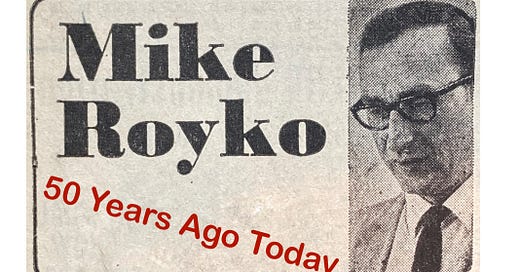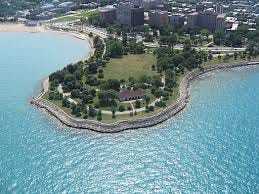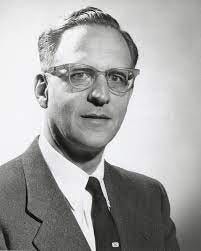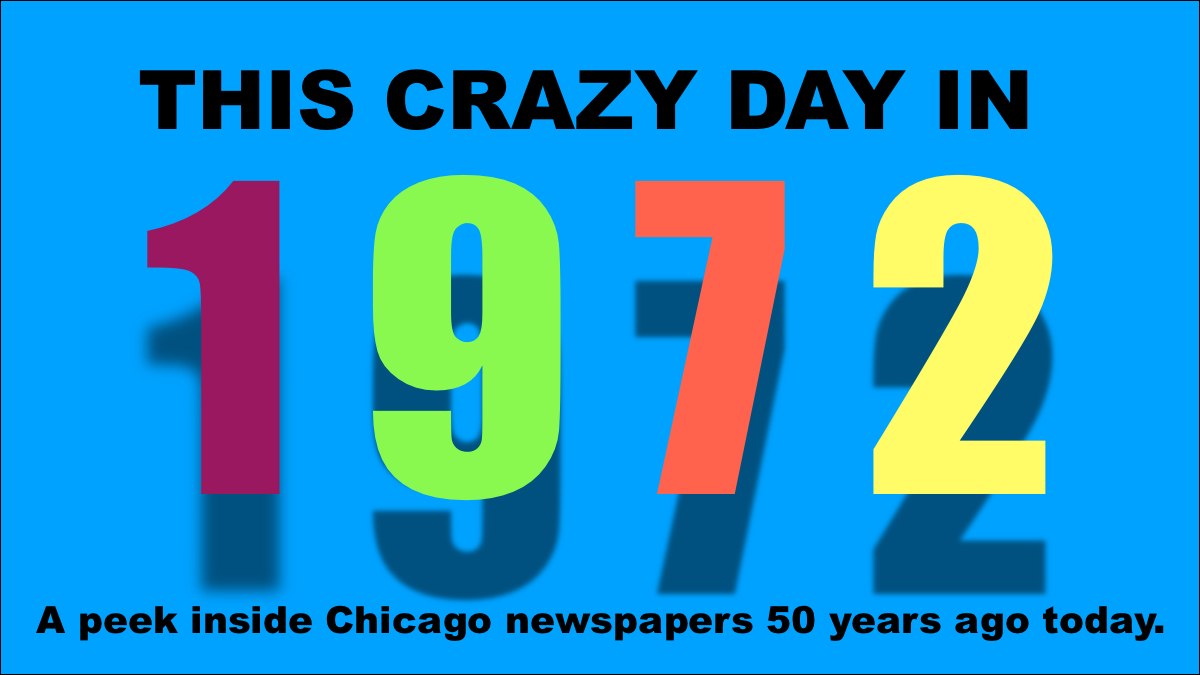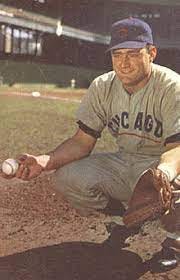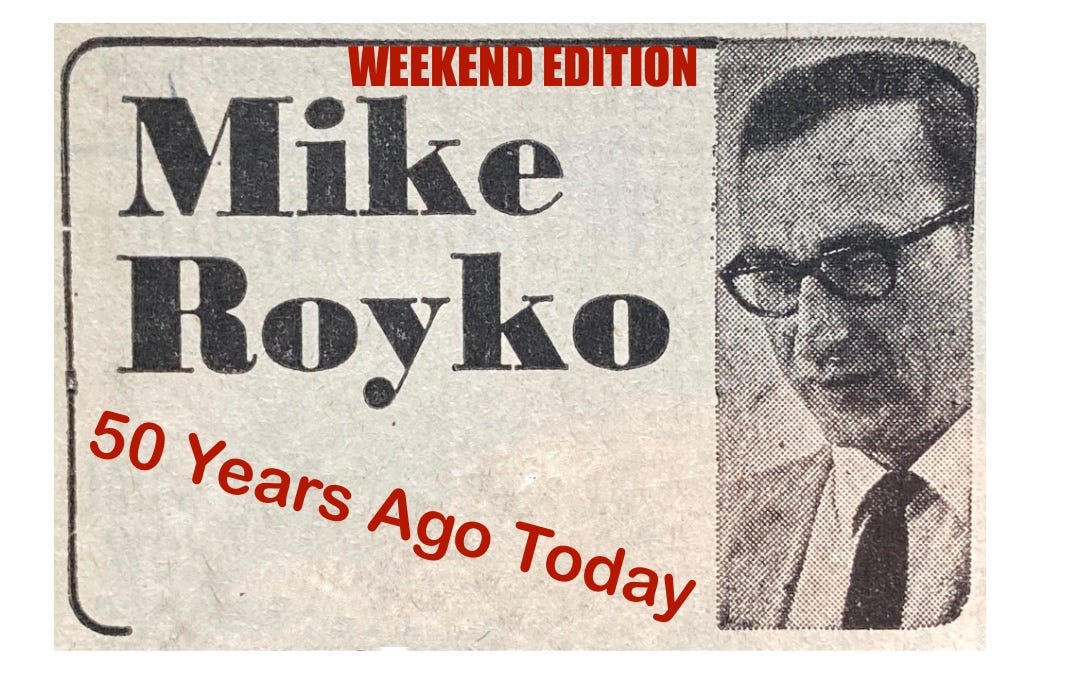Mike Royko 50 Years Ago Today: Mayor Daley saves the lakefront with a 36-story hotel
Weekly Compilation April 24-April 30, 1972
To access all site contents, click on the rose icon in the upper left corner or HERE.
Why do we run this separate item, Mike Royko 50 Years Ago Today? Because Steve Bertolucci, the hero of the serialized novel central to this Substack, “Roseland, Chicago: 1972,” lived in a Daily News household. The Bertoluccis subscribed to the Daily News, and back then everybody read the paper, even kids. And if you read the Daily News, you read Mike Royko. Read the daily Royko briefing Monday-Friday on Twitter, @RoselandChi1972.
April 24, 1972
Cabdriver’s grand coup
This is a classic among classics. If you don’t have “Slats Grobnik And Some Other Friends,” go get it so you can read this column in full, among so many others.
This is all about “the wonderful thing that happened to the cabdriver". It’s around midnight at the Billy Goat. The usual crowd of night shift workers half-fill the bar, quietly drinking. “Most heads faced the TV or their beer glasses.”
Then a happy group of people comes in. One slaps a $20 bill on the bar and tells owner Sam Sianis he’s buying the house a round.
“Sam nodded vigorously. Anybody who buys a round for the house is important.”
And the guy turns out to be a U.S. Senator visiting Chicago!
Eventually the senator’s group asks Sam to call them a cab. When the cab driver arrives, they tell him to sit down and have a drink, stuffing bills in his pocket whenever he looks at the clock.
“Just then the senator asked for a bourbon and water,” writes Mike. “Make it two,” the cabby said. “By 1:30 A.M., they were talking about Chicago politics, and somebody mentioned Vito Marzullo, a West Side ward boss.
"‘Vito’s my buddy,’ yelled the cabby, and launched into a speech about Vito’s greatness. Somebody stuffed another bill in his shirt pocket.”
Finally the senator’s group decides to leave.
“The cabdriver carefully got off the stool and stood up. He gazed across the bar at Sianis and slowly said: ‘Bartender, call us a cab. We’re leaving.’”
Sianis reminded the cabdriver that he was the cabdriver.
The cabdriver nodded and led the senator’s party out to the cab parked on Hubbard.
"He opened the door and got in the back seat. ‘Let’s go,’ he yelled. Shouting and laughing, everybody piled in, the cab pulled away from the curb and disappeared into the night. ‘I couldn’t tell who was driving,’ Sianis said later. ‘Maybe it was the senator.’”
April 25, 1972
Ed owes it all to newsmen
Mike doesn’t understand why indicted State’s Attorney Ed Hanrahan, campaigning for re-election, starts every press conference by insulting reporters.
“We are the best friends he ever had,” writes Mike. Without reporters, Hanrahan would be headed for defeat. “But because of us, he is a favorite for re-election.”
Mike knows readers will hoot and call him a nut. But, he notes, the only case Hanrahan is known for is his own indictment for his office’s pre-dawn 1969 raid on a Black Panther apartment that killed Panthers Fred Hampton and Mark Clark.
[Note: In our 1972 timeline, Hanrahan and 13 others are currently indicted for conspiracy and allegedly obstructing the investigation of the raid. They’re accused of manufacturing evidence and committing perjury.]
But how could that help Hanrahan? Because that raid “established Hanrahan’s reputation as the tough guy who killed a couple of dirty, no-good, trouble-making Black Panthers before they killed us.” Not only that, “but the lousy liberal press was picking on him for it. In these times, who could ask for a better image?”
Without that, the only thing Hanrahan would be known for is *not* doing anything about Cook County Assessor Parky Cullerton giving tax breaks to real estate pals [Note: particularly Arthur Rubloff and Charlie Swibel]. Those questions from reporters, Hanrahan always “just sidestepped or ignored”.
“Now, when he is asked (about Cullerton), all he has to do is trot out a law-and-order slogan, the Panther case comes to mind, and he’s a hero again,” writes Mike.
“The newsmen did it for him. We’re responsible for his being remembered for his Panther Hunt, rather than for his political Swan Dive.”
April 26, 1972
It’s your lake so back off!
“Mayor Daley, like any good comedian, delivers his best lines with a straight face.
“And he was getting them off to perfection yesterday as he took part in a ground-breaking ceremony for Hyatt Regency Chicago Hotel, on Wacker Dr. east of Michigan Av.”
As you’ll see, Mayor Daley’s groundbreaking speech turns into a peon to his devotion to an open lakefront for the people. Why? Background before we get to Mike’s column:
Illinois Rep. Robert Mann (D-Chicago) is trying to pass a Lake Michigan Bill of Rights in the state legislature. He got it approved by the House somehow, despite Mayor Daley’s opposition.
Mann’s bill would put the kibosh on Mayor Daley’s dream project, an airport in the lake eight miles off 55th Street. Imagine the contracts just for building the bridge connecting that monster to—what? Promontory Point? Fifty-seventh Street beach? Or maybe it would land in Jackson Park, the off ramp arcing over the Museum of Science and Industry?
As covered in THIS CRAZY DAY IN 1972, Rep. Mann appeared at an April 14 meeting of the Chicago City Council’s Environmental Control Committee, focused on the future of the lakefront.
“Let’s be candid about it—the next 10 years will be crucial to the life of Lake Michigan,” Mann told the aldermen. “Not only is the process of eutrophication or aging accelerating rapidly due to overdoses of pollutants, but also the lake continues to serve as a sink for toxic substances.”
But Mayor Daley’s commissioner for development and planning, Lewis Hill, appeared too—and he said the Daley administration opposes Mann’s Lake Michigan Bill of Rights because it “abrogates and dilutes the ability of the city to continue to preserve the lake.”
Instead, wrote Ray McCarthy in Chicago Today, “Hill presented an eight-point program which contained sweeping guidelines for conservation of the lake as a natural resource”.
The Daily News’ Jay McMullen (future husband of future Mayor Jane Byrne) noted that the most important points of Daley’s lakefront plan, presented by Hill, are that the “lake and shoreline area” can only be used for public purposes, and even then, nothing can be constructed if it will diminish water quality or cause ecological damage.
The issue is going to be what “lake and shoreline area” means. Hill never defined either term.
“Ald. Leon M. Despres (5th)” —legendary Ald. Despres, perhaps the thorniest of independent Democratic thorns in Mayor Daley’s side— “in a statement following Hill’s testimony, charged that the principles ‘are an attack on the lake,’” wrote McMullen. According to Despres, “‘Under the new principles, the machine plans to give away or sell off all the lakefront and to limit protection to the few feet of beach described as ‘lake and shoreline area.’”
Despres went on: “The principles reverse the burden of showing environmental damage. They clearly favor lake defacement and scarring unless someone shows clear proof of environmental damage. The burden of proof should be the other way around.”
This is why Mayor Daley will oddly spout off about protecting the lake and opening up the lakefront to the people at the groundbreaking for a $40 million, 36-story luxury hotel. Note Despres’ use of the word “defacement,” because Daley’s April 24th groundbreaking remarks are a direct retort.
Here’s the picture that accompanied Robert Herguth’s article in the April 25 Daily News on the groundbreaking ceremony, covered in this week’s THIS CRAZY DAY.
Back to Mike!
Mike chews up Mayor Daley’s dog of a speech in his usual lightning prose. After one swift column of type, there’s nothing left but the skull and spine, picked clean.
Mayor Daley, notes Mike, “shared some of his thoughts” on the lakefront. Daley boasted, “No one has defaced our lakefront.”
“He actually said that, and nobody laughed,” writes Mike. “In fact, the hotel executives rapidly beat their palms together.”
Mike recounts Daley’s recent record on the lakefront:
*Meigs Field, then an airport for private planes, built on “an island that was intended for recreation”.
*McCormick Place, which “could have been built almost anywhere” but now takes up the lake at 22nd St, plus all the attendant parking lots.
*What we used to call the “Stevenson spur” coughing cars out onto Lake Shore Drive at McCormick Place from the Stevenson, and also from the Dan Ryan and Kennedy.
*And Jackson Park, where people chained themselves to trees a few years earlier to keep them from being cut down to add four-lane Cornell Drive through the heart of the park.
“The Normandy invasion left fewer scars on the coast of France,” writes Mike.
“That thigh-slapper having been delivered, [Daley] went on to say:
“‘Our plan for the future is to open up the lake to the people.’”
Which people, Mike wonders.
The Illinois Central Railroad people, currently selling the air rights over all their rail yards east of Michigan Avenue along the south bank of the Chicago River?
Or the airline people, chomping at the bit for that lake airport?
“There is no way you can have an airport in the lake without kissing off most of the South Side lakefront. It will turn into Mannheim Rd. on the Water.”
Mayor Daley also oddly talks about having people live downtown, instead of commuting an hour to get to work—though he is at the groundbreaking for a luxury hotel, not a subdivision.
That’s something, writes Mike, that people have talked about whenever “the city administration swept away acres of little houses and replaced them with highrises that were beyond the ordinary person’s means” and “every time urban renewal took something away from the people, giving back nothing.”
“And finally, the stand-up comedian said:
“‘We should be proud of what we’re doing here. Despite all the criticism in the media, what city ever planned a Grant Park?’
Mike’s closer:
“Which city? That’s easy. The same city that will probably destroy a Grant Park.”
If you dig Mike Royko, you’ll want to see the news he’s writing about. Check it out here!
April 27, 1972
Greatest Cubs of all time
“A lot of young Cub fans are upset because of the way their heroes are playing.
“It happens every year. And every year I have to explain that this is our heritage as Cub fans….I have watched the Cubs for about 30 years, and for every good ballplayer, they have had a dozen who appeared to be undergoing occupational therapy.”
So it’s the right time, Mike figures, to name his “all-time favorite Cub all-star team”.
Two entries:
“SECOND BASE: Bob Ramazotti. He could do everything—walk, talk, stand up, sit down, sleep, eat.”
“CATCHER: Harry Chiti. Anyone who saw Chiti play can never forget it—hard as they try.”
Once, a pitcher was trying to walk Chiti because the next batter “was even worse.”
“Chiti slouched, sort of dozing” for the first two outside balls.
“Then on the third outside pitch, he lunged forward and swung. The ball popped over first base and Chiti took off like a crazed hippo.
“The fielders were shocked and by the time they found the ball, Chiti had staggered around the bases and collapsed on third base. The hit helped boost his average to .212 and helped the Cubs coast to last place.”
Do you love Marina City as much as most people? Learn a bit about it here, along with its next door neighbor, the IBM Building, in Chapter 2 Notes, Part 2: Architectural Thunderdome on the North Bank, Marina City v. the IBM Building

April 28, 1972
How Chicago works (cont.)
Another educational Q & A!
“Q - Which American city works?
“A - Everybody knows that. Chicago is the only city that works.
“Q - Who says so?
“A - Holiday Magazine, Ald. Vito Marzullo, and Earl Bush, the mayor’s press agent, that’s who.”
Let’s break that down.
Holiday Magazine: There could have been a recent Holiday Magazine article on Chicago, but it’s also possible that Mike meant to say Town and Country. That hoighty-toighty magazine did a Chicago spread which Mike wrote about on January 24.
To uncover the real Chicago, Author Ted Burke interviewed Chicago’s 1972 elite for the piece—such as Bonnie Swearingen, wife of Standard Oil’s board chairman.
“Burke considers Mrs. Swearingen, who has lived here all of three years, to be an authority on Chicago,” Mike wrote. “She confided to Burke: ‘I eat natural honey with the honeycombs, especially before making love. That is what athletes take before a big game.’”

Overall, noted Mike, author Burke “has concluded that life for the masses in Chicago is almost too good to bear. Naturally he gives most of the credit to—who else?—Mayor Richard J. Daley.”
Vito Marzullo: Mike loves to pick on Ald. Marzullo, one of Daley’s closest allies. A great example of Marzullo’s typical oratory regarding Mayor Daley came just last week when Mayor Daley began his 18th year in office:
Ald. Leon Despres—see above in the April 26 column coverage—gave the Daily News a long laundry list of problems under Daley’s 18-year reign, including “profligate increase in residential property taxes, the frightful expansion of patronage politics, the decline in personal safety, the inadequacy of environment protection measures, the partisan domination of the Board of Education, the decline of the parks, the disfigurement of the lakefront, and above all, the uninterrupted support of color segregation, discrimination and neglect.”
But Ald. Marzullo said: “I’ve never seen a man more dedicated, more sincere, more hard working, or a man that has the city, the country and the state on the tip of his fingers than Mayor Daley. He’s the seventh mayor I’ve seen, and none of the others could hold a candle to this man. He never lets anything go by without putting his hands in and trying for a remedy. He’ll never shirk any responsibility. He’s a leader, not a boss.”
Earl Bush, Mayor Daley’s press secretary: You can imagine Mike and Mayor Daley’s press secretary might have a strained relationship. The last time Mike wrote about Earl Bush was December 23, just after Mike’s giant front-page scoop on the colossal orgy of signature-forging by Machine flunkies when Mayor Daley dumped indicted Cook County State’s Attorney Ed Hanrahan off his endorsed slate of primary candidates, and replaced him with Traffic Court Judge Raymond Berg—on the very day that voter petitions were due at the County Clerk’s office to get candidates on the primary ballot.
When Mike called Earl Bush to get a comment, the official statement Bush gave him was “Bullshit.” Mike wrote that it was the first time in his career that he’d heard of a political office using “bullshit” as an official position.
“I don’t see how it can be the position of anyone but a bull,” he wrote, and then went full throttle mocking Earl Bush. Mike claimed Bush was known for his “wit and clever use of words…And when someone calls his office with a question, it isn’t unusual for him to parry with such rejoinders as: ‘What?’ or ‘Hnggg?’ or even a subtle belch.”
Back to the Q & A.
“Q - Can you give an example of how well [Chicago] works?
“A - Of course. Only yesterday, we had another triumph, this time in the field of education. One of our public school students won a National Merit Scholarship.”
…. “Q - Then why are people always carping about Chicago’s public school not being any good.”
“A - I just don’t know. Some people can’t do anything but criticize. You never hear Holiday Magazine, Ald. Vito Marzullo or Earl Bush criticizing.”
“Q - But did any other school districts win National Merit Scholarships?
“A - Why don’t we talk about Richie Allen, instead.
Note: At this point in the season, brand-new White Sox star Dick Allen is batting .452. That is not a typo.
“Q - Are you trying to hide something?
“A - Careful, or I’ll send the building inspectors to your house.”
As it turns out, with 99 National Merit Scholarships so far in the Chicago area, one went to a CPS student, while seven went to students from Chicago Catholic schools. The rest went to suburban students. And other cities—cities that are known not to work, like New York and Milwaukee—all got multiple winners.
“Q - And Detroit, another city that doesn’t work?
“A - Five. Can’t we talk about Richie Allen?”
“Q - No. What about Philadelphia, Pittsburgh, Los Angeles, New Orleans?
“A - About five or six. In LA, maybe eight. But Richie Allen is really hitting that old ball. He makes this city work.”
…. “Q - But if the school system is this bad, how can you say the city works?
“A - Look, haven’t you seen our wunnerful skyscrapers, our great expressway systems and all the other new symbols of Chicaguh?”
UPDATE
In “Lake Forest has a crisis” on March 15, Mike advised that even that posh North Shore suburb has problems.
“Sometimes one of the country clubs has a shortage of caddies. Or rain will fall during a lawn party, soaking the finger sandwiches.”
And back in March, a Lake Forest couple wanted to sell their mansion and estate to a group that wants to convert it into a home for retarded children. But the village board voted 5-2 against granting the zoning change to make that possible, because enough Lake Foresters united against it.
“Some people said the presence of the retarded children would shrink the value of their own property,” wrote Mike. “Others said the children’s home would have a detrimental effect on their ‘life style.’”
The village board’s reasoning was straight out of Catch-22, wrote Mike. “The board…reasoned that while the fears of the Lake Forest citizens had no real basis, the fear itself was genuine. Therefore, their irrational fears deprived these residents of ‘full enjoyment’ of their own property.”
Lake Forest residents could not have enjoyed the attention their fair town reaped from that episode. On April 23, the village board held a special meeting to reconsider and voted 7-1 in favor of granting the zoning change to the Glenkirk Association for Retarded Children.
As Chicago Today reported, opponents were given “an extended say yesterday and were unable to keep the council from changing its vote.” Since the original negative vote, per Today, “535 residents signed petitions favoring the zoning variance. A great deal of material on the nature of mental retardation also was amassed by both the Glenkirk group and the council.”
Oddly, the Daily News only ran a much smaller article than Today, and that was before the official vote was taken. The Tribune ran a lengthy article before the special meeting, and another lengthy article a week later.
Per the Trib: “The council’s turnabout apparently was prompted by Ald. James Swarthout, a Glenkirk supporter, who learned after the March decision of an Illinois law designed to protect the rights of the mentally handicapped.
“Noting that several aldermen predicated their negative votes on neighborhood fears that property values would plummet, Swarthout told the council that the law specifically prohibits discrimination based on conjecture that the surrounding neighborhood would suffer.
“Swarthout and Ald. W. Fenton Guinee Jr. told the council they had surveyed 14 Midwest communities where homes for the mentally retarded exist. In each of the communities, they said, officials assured them there have been no problems stemming from the homes.”
The Trib also noted that the Lake Forest village board (or City Council, as Today and the Tribune call it) “set down 12 conditions before approving Glenkirk’s plans. One of the conditions calls for a six-foot fence in the areas adjacent to homes, a measure intended to mollify some home owners who fear that their children could be harmed by Glenkirk residents, city officials said.”
“This will work both ways; our children will not be harassed either,” said the director of the Glenkirk Association.
As we here all know, weekends could be sad for a Daily News family because Mike Royko wasn’t in the Daily News’ single weekend edition. So we look for Mike elsewhere on weekends.
This week, I’d like to repost an essay I wrote for the Chicago Literary Hall of Fame’s website for the 25th anniversary of Mike’s death. If you’re not familiar with the CLHOF, check out their website and events—you’ll probably dig it.
Some examples of the great stuff over there: Click on the names of any of the approximately 50 inductees so far, and you’ll find a terrific biographical sketch and list of works. Go to the page for the Fuller Award for Lifetime Achievement—given to living authors—and you can click on the picture of the program from the award ceremony to read essays on those writers. And here’s the link for the CLHOF blog.
25 years without Mike Royko
Mike Royko died 25 years ago, on April 29, 1997.
It’s only right to start a remembrance of Mike Royko with a quick one-sentence lede. The swift jab of his lede was a hallmark we all appreciated, straight through to the knockout punch of his snappy conclusion.
Here’s an iconic example from October 19, 1971, on the imminent destruction of Adler & Sullivan’s masterpiece, the Old Stock Exchange:
“How does it feel to profit from the destruction of an architectural landmark of worldwide importance?” Mike asked, before ripping the eight owners hiding behind a secret land trust as they maneuvered to demolish that irreplaceable piece of Chicago history.
The eight men were all big in La Salle Street financial circles, leading to Mike’s killer last line: “As one might say on La Salle St.: Beauty is only ledger deep.”
Mike Royko was only 64 years old in 1997, so his death was a shock to family, friends and readers alike. Chicago certainly mourned Mike Royko at the time. But for any significant loss, it takes years for the real magnitude to sink in. Even as you get used to the world without someone you loved in it, there are times when you suddenly feel their absence more keenly than ever. It’s a disconcerting combination.
That’s how it is for family and friends. It’s like that too, on an admittedly different level, for people like me who never had the opportunity to meet Mike Royko. Most of us got to know and love Mike Royko through his columns. There are thousands upon thousands of us, because Mike touched so many people he would never meet, writing five days a week for over 30 years, starting in 1963 for the Chicago Daily News.
Family and friends have those bittersweet moments when they tell old stories, go through photo albums, unexpectedly find a favorite tchotchke tucked away in a drawer. For readers, it’s when we come across Mike Royko quoted somewhere, or even better, an entire column.
I fully realized how big a void Mike Royko left behind when I started writing a novel set mainly in the South Side neighborhood of Roseland in 1972. The main characters are ten years old that year, as I was. I drew on plenty of research. But as writers know, a lot simply comes out of your brain through your fingertips as you type. Certain aspects of that 1972 world just kept popping up, unbidden, including the centrality of newspapers in everyday life.
Everybody read newspapers in 1972. It’s easy to forget because newspapers have been dwindling away for so long now. But 1972 was still part of a golden age of newspapers when everybody, everybody, everybody read the paper. Even kids read the papers. There wasn’t much else to do. No internet. No video games. Three network channels on what was probably a black-and-white TV, plus Channel 9 and 11. A couple of UHF channels if your antenna was really good or your house was in just the right spot.
But there was always a newspaper laying around nearby, whether you were sitting around at the kitchen table or killing time in a lobby or restaurant. Practically every family subscribed to a paper. It was like an extra relative in everybody’s house.
And if your family read the Chicago Daily News, then you read Mike Royko. You all read Mike Royko.
You’d take a quick look at the front page, then flip to page three to read Mike. Seeing his column in a long thin strip running down the inside of the page, with his picture at the top, was always a little bit like opening a present on Christmas morning. Something special, five days a week.
Like your real relatives, you came to rely on Mike Royko without even realizing it. When something big happened, you hoped Mike would write about it so you’d know what to think.
Not that everyone always agreed with Mike Royko--one of the best things about Royko was that you never knew for sure what he was going to say. Half the time you might hate what he said. Later, you might realize he was right. Or you might not. He wasn’t perfect. But then, neither were you. Neither was anybody else, then, now, or ever in the history of the world. The important thing was: Reading what Mike Royko had to say about anything was part of figuring out your own opinion.
That’s an astonishing responsibility, when you think about it, and it’s well documented that the pressure of writing the column wore on Mike Royko.
But why is Mike Royko important now? When most Chicagoans are too young to remember Mayor Richard J. Daley, much less the guy who wrote a best-selling biography of him?
Because we can’t possibly understand the present, and go forward sensibly into the future, without any knowledge of our past. As Emerson wrote, “There is a relation between the hours of our life and the centuries of time.”
And as many have said, Mike Royko was Chicago. That doesn't mean he was the only Chicago. No one person can universally personify a vast metropolis. But he came from the city's neighborhoods and wrote from the heart with an empathy that meant you didn't have to be a man to read about yourself in Mike Royko. You didn't have to be Polish-Ukranian, son of immigrants, born in 1932, serve in the army during the Korean War, or live on the Northwest Side. When you thought you knew exactly what a Polish-Ukranian vet born in 1932 would think about an issue, Mike Royko usually took your expectations and threw them off a cliff.
You can learn the facts about 20th century Chicago without Mike Royko--but why would you want to? It would be a wan, flabby version of the city.
When I decided to serialize my novel, Roseland, Chicago: 1972, I added two parallel threads for readers who wanted to learn more about the city and the time period. First, THIS CRAZY DAY IN 1972 is a daily peek inside Chicago’s five daily newspapers of the time, a smattering of everything from the front-page stories to the ads.
I could have included Mike Royko in there, but Royko dominated the Chicago newspaper landscape in a way that no one had ever done before, and never will again with the splintering of media on the internet. So Royko needed his own feature, Mike Royko 50 Years Ago Today. There, I summarize each 1972 column as it comes, pull out the best quotes, and give the political and social context younger readers need to understand the major players, references and jokes.
In this small way, I’m trying to create a way for younger Chicagoans to get to know Mike and his city, which is a step toward knowing themselves and Chicago today.
Plus, Mike Royko is hilarious.
By the way, this feature is no substitute for reading Mike’s full columns. He’s best appreciated in the clear, concise, unbroken original version. Mike already trimmed the verbal fat, so he doesn’t need to be summarized Reader’s Digest-style, either. Our purpose here is to give you some good quotes from the original columns, but especially to give the historic and pop culture context that Mike’s original readers brought to his work. You can’t get the inside jokes if you don’t know the references. Plus, many columns didn’t make it into the collections, so unless you dive into microfilm, there are some columns covered here you will never read elsewhere. If you don’t own any of Mike’s books, maybe start with “One More Time,” a selection covering Mike’s entire career and including a foreword by Studs Terkel and commentaries by Lois Wille.
Do you dig spending some time in 1972? If you came to MIKE ROYKO 50 YEARS AGO TODAY from social media, you may not know it’s part of the book being serialized here, one chapter per month: “Roseland, Chicago: 1972.” It’s the story of Steve Bertolucci, 10-year-old Roselander in 1972, and what becomes of him. Check it out here.
To get MIKE ROYKO 50 YEARS AGO TODAY in your mailbox weekly along with THIS CRAZY DAY IN 1972 and new chapters of the book—
SUBSCRIBE FOR FREE!

